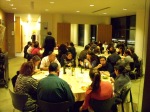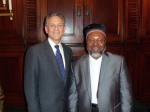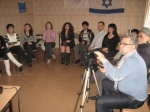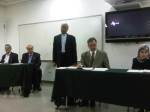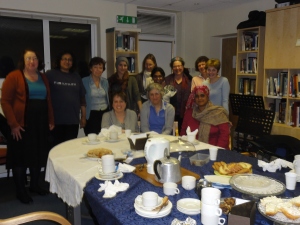submitted by Walter Ruby, Muslim-Jewish Relations Program Officer, Foundation for Ethnic Understanding, photos by Audrey David
“What does being Jewish/Muslim mean to me?” “How do my faith and identity inform my personal values and how I function in the world?
These were the central questions that a roomful of Jewish and Muslim young professionals publicly grappled with—and posed to each other—during a scintillating dialogue on identity following a Shabbat dinner at the JCC in Manhattan on the evening of Friday, November 18.
After hearing greeting from Rabbi Carol Levithan and Audrey Davis of the JCC in Manhattan, which had hosted Muslim and Jewish Weekend of Twinning events for the last three years, about 50 young professionals from organizations like the American Society for Muslim Advancement (ASMA Society), Muslim Bar Association of New York, Council for the Advancement of Muslim Professionals (CAMP), Muslim Public Affairs Council (MPAC) and a coterie of young leaders from the JCC, including members of Generation R, watched a a series of film clips produced by Unity Productions, in which Jewish and Muslim community heroes discussed their religious identities and how living their faith has impelled many of them to lives of service to people in need.
Among those appearing on the film clips were Rabbi Shmuely Yankelowitz, the founder of Uri L’Tzedek, who led a protest at a kosher chicken-packing plant in Iowa that exploited Latino immigrants; Najah Bazzi, a Muslim community activist and nurse in Dearborn, MI, who works with the terminally ill; Ari Teman, a stand-up comedian who created JCorps, a network of young Jews who volunteer in soup kitchens and homeless shelters; Kevin James, a Muslim New York City firefighter who answered the call on 9-11; and Daisy Khan, the high profile director of the ASMA Society, who also attended the twinning event at the JCC and spoke of how her faith leads her to reach out to non-Muslims concerning her belief that Islam is a religion of peace and inclusivity.
In a wide-ranging discussion following the viewing of the video clips that was moderated by Walter Ruby, Muslim-Jewish Relations Officer at the Foundation for Ethnic Understanding, and Sami Elmansoury, a Muslim community activist who serve as an advisor on immigration to Manhattan Boro President Scott Stringer, participants in the twinning event addressed the central issues raised in the film clips, and remarking that viewing the film had enlightened them as to the shared core beliefs and values in Islam and Judaism concerning the moral imperative of every Jew and Muslim to repair the world and succor those in need (tikkun olam and islah). Many said they had not been aware until viewing the film that the injunction, ‘If you save one life, it is as if you saved the whole world’, appears in both the Talmud and the Quran. Many said they had also been unaware that there were leaders in the other community willing to confront injustice or intolerance in their own communities, and that learning that had positively impacted their perception of the other faith.
When several of the participants in the twinning event remarked that they would love to volunteer together with members of the other faith to help people in need, they learned that a venue for doing so already exists. Two participants in the discussion; Uzma Kaleem and Kyla Pollack, announced that they are co-leaders of the recently formed Jewish-Muslim Volunteer Alliance (JMVA), whose members have volunteered together at Habitat for Humanity and feeding the homeless. According to Pollack, “Doing service projects together positively impacts the larger community and changes all of us for the better.”
Amen. There could be no better summation of the spirit of the Weekend of Twinning than that.

